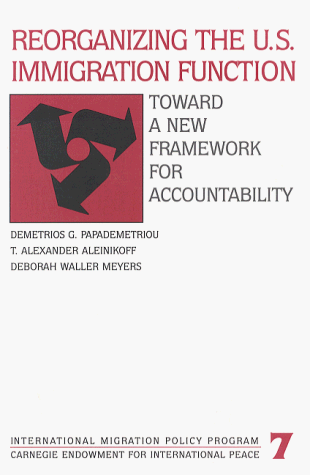International Mitigation
1 total work
Reorganizing the U.S. Immigration Function
by Demetrios G. Papademetriou, T. Alexander Aleinikoff, and Deborah Waller Meyers
Published 1 August 1998
At current migration rates, about two-thirds of US population growth in the next 50 years will be attributable to immigrants, their children, and their grandchildren. Despite the issue's importance, the Immigration and Naturalization Service has relatively low stature, and no formal structure exists within the Executive Branch for coherent immigration policy development. This is especially problematic because the immigration function cuts across numerous critical policy issues ranging from social security, welfare, and human resources to education, economic competitiveness, law enforcement, and foreign policy. Frustration with INS performance has been mounting for a decade, as have charges that the system is incoherent, overburdened, poorly run, and accountable to no one. Some in the US Congress now propose dismantling the agency and distributing its functions to other agencies. The authors of this book argue that, among the several reform proposals that have been proffered, theirs is the only effort to redesign the system in light of its fundamental objectives.
Their proposal, calling for a new, high-level agency to direct and consolidate the nation's immigration system, also seeks to establish a clear distinction between enforcement and services and to improve the delivery of all programmes, including the trouble-plagued services.
Their proposal, calling for a new, high-level agency to direct and consolidate the nation's immigration system, also seeks to establish a clear distinction between enforcement and services and to improve the delivery of all programmes, including the trouble-plagued services.
